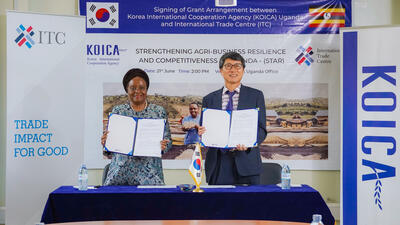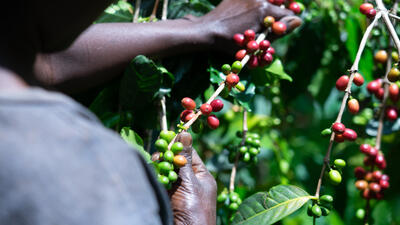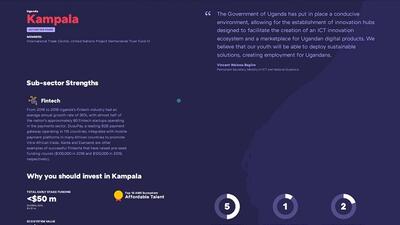
Addressing Non-tariff measures can help Ugandan companies boost their competitiveness (en)
(Kampala-Geneva) – Almost half of exporters and importers in Uganda face challenges related to non-tariff measures (NTMs), according to a report published by the Geneva-based International Trade Centre (ITC).
The report, Uganda: Company perspectives – An ITC Series on Non-Tariff Measures, highlights obstacles that Ugandan exporters and importers face when complying with trade regulations and procedures. The findings reflect interviews with nearly 500 exporters and importers, and provides suggestions on how to address these challenges.
‘Specific private sector insights included in this report are essential in helping Uganda shape its strategies and policies in our effort to build a business environment that is more conducive to trade,’ said Hon. Amelia Kyambadde, Uganda’s Minister of Trade, Industry and Cooperatives, during the presentation of the report in Kampala.
‘Uganda: Company perspectives is an important element of the toolbox that supports existing work taking place in Uganda to strengthen enterprise competitiveness,’ said ITC Executive Director Arancha González. ‘It will help build an even stronger foundation to reduce or eliminate some unnecessary barriers to trade and support Ugandan businesses to really benefit from domestic, regional and global trade opportunities.’
The main obstacles identified by the report are product certification and technical requirements. The findings also suggest that better export-quality management within Uganda – including laboratories for testing, certification and standards development – would improve the competitiveness of micro, small and medium-sized enterprises (MSMEs).
These observations are confirmed by Ugandan businesses. Ovia Matovu, Chief Executive Officer of the Uganda Fish Processors & Exporters Association (UFPEA), said: ‘Quality requirements and controls imposed in Uganda and in partner countries are good things as long as they do not add extra costs and delays. Otherwise, they put our products at a disadvantage in international markets.’
Uganda is the world’s biggest exporter of Nile perch, but there are many other areas that the country can build competitiveness in. In 2016, coffee, cocoa beans, cement and solid cane or beet sugar were the most exported products, in particular to the East Africa region. In fact, according to ITC’s Export Potential Map, an estimated $1.1 billion worth of unexplored export potential exists in the trade with Uganda’s neighbouring countries.
While the ITC report demonstrates that 30% of the trade barriers facing Ugandan enterprises occur in the East Africa region, most obstacles are found in Uganda itself. These include delays, high fees and charges, limited testing facilities and informal payment. Chief among the report’s recommendations is the implementation of automated border clearance as a way to reduce delays and increase transparency.
In response to the report, Uganda’s Ministry of Trade, Industry and Cooperatives of Uganda has already stepped up its effort to increase trade transparency and dialogue by taking concrete action.
For instance, as a result of the Ministry’s outreach, Uganda is currently the most active user of ePing, the online information alert system for sanitary and phytosanitary measures and technical barriers to trade. Developed by ITC, the World Trade Organization and the United Nations Department of Economic and Social Affairs, ePing allows companies and policymakers to get timely information and engage in dialogue on NTMs.
Note for the Editors
Download Uganda: Company perspectives – An ITC Series on Non-Tariff Measures.
Learn more about ITC’s work on non-tariff measures.
Learn more about ITC’s Export Potential Map.
Learn about the ePing alert system.
About ITC
The International Trade Centre is the joint agency of the World Trade Organization and the United Nations. ITC assists small and medium-sized enterprises in developing and transition economies to become more competitive in global markets, thereby contributing to sustainable economic development within the frameworks of the Aid-for-Trade agenda and the United Nations’ Sustainable Development Goals. For more information, visit www.intracen.org
Follow ITC on Twitter | Facebook | LinkedIn | Instagram
For more information, please contact:
International Trade Centre
Jarle Hetland
Media Officer
Office of the Executive Director
P: + 41 22 730 0145
M: + 41 79 582 9180
E: hetland [at] intracen.org (hetland[at]intracen[dot]org)













